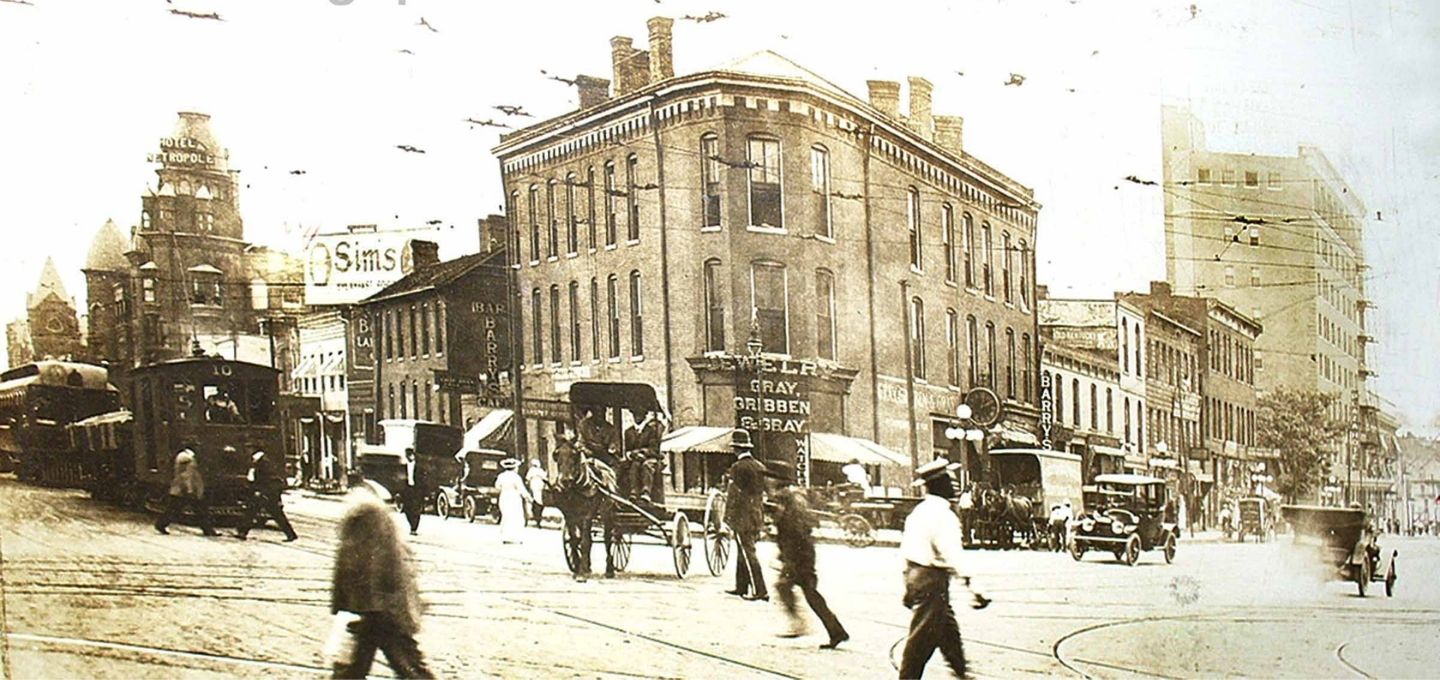Celebrating Black innovators and entrepreneurs from Indiana
In honor of Black History Month, we’re taking a closer look at some of the fascinating Black innovators and entrepreneurs who have made a lasting and significant impact on Indiana and in many cases, indeed, the world.
From the familiar names and institutions to the lesser-known pioneers, this list of great Indiana achievers isn’t supposed to be comprehensive. It’s a conversation starter of people who stand out to us and we welcome your comments on other Black innovators and entrepreneurs who have blazed trails worthy of celebration.
Madam C.J. Walker (1867-1919)
No list of this kind can go far before mentioning one of our state’s most recognized entrepreneurs—Madam C.J. Walker. It has literally been 102 years since she died, but Walker’s storied life still garners so much interest that Netflix aired the four-part mini-series “Self Made: Inspired by the Life of Madam C.J. Walker” just last year. The mini-series is based on the book “On Her Own Ground,” which was written by Walker’s great-great-granddaughter A’Lelia Bundles.
It would be hard not to be inspired by the first free-born daughter of former slaves turned sharecroppers who would eventually become known as the first Black American self-made millionaire and first female self-made millionaire. There is far too much written about Walker for me to do her story justice in summary here. We strongly encourage you to visit the Madame Walker Legacy Center website and browse the resources provided on the About and History pages. A few facts that stand out:
- Walker was a talented entrepreneur and marketer who used her own photos in advertisements and on tins of Madam Walker’s Wonderful Hair Grower.
- At the height of her success, Walker employed approximately 3,000 people at the manufacturing site in Indianapolis and 20,000 agents, or hair culturists as she called them, across the country.
- Mary Kay Cosmetics would later copy Walker’s pioneering direct sales and marketing model.
- Walker became almost as well known for her philanthropy as for her hair-care products. She amassed a fortune equivalent to $9 million today and she used her financial strength to help other Black women and supported numerous racial equality causes.
- You can still purchase Madam C.J. Walker Beauty Culture products by Sundial (acquired by Unilever)
- In part as an homage to Walker’s enduring legacy, Unilever and Sundial created the New Voices Fund, a $100 million fund to empower women of color entrepreneurs.
Indianapolis Recorder Newspaper, Founding Publishers George P. Stewart and Will Porter (1895)
Now in it’s 126th year, the Indianapolis Recorder Newspaper started as a two-page church bulletin in 1895. Two years later, co-founders George P. Stewart and Will Porter expanded their successful news sheet into a weekly newspaper called The Indianapolis Recorder. Today, the paper is considered one of the top African-American publications in the country and the fourth oldest Black newspaper in the United States.
Over its history, the award-winning Recorder newspaper was a training ground for many journalists, including William Raspberry, a Pulitzer Prize-winning journalist for the Washington Post; Steve Hammer, a longtime columnist for independent Indianapolis weekly NUVO; and numerous writers and editors at the Indianapolis Star, including Eunice Trotter and Kim Hooper.
From the paper’s About page: The Indianapolis Recorder has been a major voice for the local community, the state of Indiana, the nation, and internationally. From the beginning, the Recorder has been an advocate for those who could not express their thoughts or concerns; they’ve also been a supplier of truth and justice. The vision of the paper’s founders was to create a publication that would speak to and for the people. The Recorder today continues to hold that original vision in high regard. They communicate in order to increase awareness, educate and motivate the community as well as preserve the community’s knowledge of relevant issues. The Recorder, as with other Black newspapers, are not only voices in the community, they are also advocates for African-Americans and minorities as well as the underserved.
Charles Edwin Wiggins (1897-1979)
As with Madame Walker, it would be hard to talk about Black innovators and entrepreneurs of Indiana history without including a representative from the sport of race car driving. Driver, mechanic and business owner Charlie Wiggins is a great example of the passion and perseverance exhibited by many black innovators in the sport who were shut out of participating in whites-only events, including the Indianapolis 500 at the time.
However, Wiggins was a leading light in the parallel Colored Speedway Association championships. His dominance during this period was such that the popular media dubbed him the Negro Speed King. He won the prestigious, annual, Gold and Glory Sweepstakes race four times between 1926 and 1935. His dominance over the sport was partly thanks to his uniquely efficient engine that he himself engineered to run on a new fuel combination he invented.
Outside of racing, Wiggins was a successful automobile businessman who started as a shoeshine boy outside of a mechanic’s shop in Evansville, Ind., where he was born. He rose to the position of lead technician, this despite the fact that the remainder of the service crew were white. After moving to Indianapolis with his wife in 1922, Wiggins’ technical expertise rapidly gained him another leading position at an auto repair garage in the Southside area of the city, and when the owner retired two years later Wiggins bought the business.
David Crosthwait, Jr. (1898-1976)
Engineer, inventor and Purdue University graduate David Crosthwait, Jr. held numerous patents relating to heat transfer, ventilation, and air conditioning, and he even designed the heating system for New York City’s famed Radio City Music Hall. Holding bachelor’s and master’s degrees from Purdue in engineering, Crosthwait spent the majority of his career working as a research engineer and director of research laboratories for a company in Iowa. He authored texts and guides on heating and cooling and returned to Indiana and his alma mater in 1970 to teach a course on steam heating theory and control systems. For his achievements, Crosthwait was named a fellow of the American Society of Heating, Refrigeration, and Air Conditioning Engineers in 1971, making him the first African American to receive this honor.
Percy Lavon Julian (1899–1975)
Chemist, entrepreneur and DePauw University graduate Percy Lavon Julian (1899–1975) ingeniously figured out how to synthesize important medicinal compounds like steroids from abundant plant sources, making them more affordable to mass-produce. Julian was valedictorian of his 1920 DePauw class and he returned to teach and discover at the Greencastle, Ind. school after earning his master’s from Harvard University, and a Ph.D. from the University of Vienna in Austria.
It was at DePauw that he accomplished the first total synthesis of physostigmine, which is still used today to treat glaucoma. Julian later worked at Glidden as director of research before founding Julian Laboratories. He made many advancements in the fields of sex hormones and pioneered the manufacturing of cortizone and hydrocortizone. Read more about Percy Lavon Julian.
The Chicago Six – Founders of the Society of Black Engineers and the National Society of Black Engineers (1975)
Purdue University students John Logan, Edward Coleman, George Smith, Stanley Kirtley, Brian Harris, and Anthony Harris—known as the Chicago Six—founded the Black Society of Engineers (BSE) with the help of their advisor Arthur Bond. Anthony Harris proposed changing the name to Society of Black Engineers (SBE) in 1976 and he began reaching out to engineering programs and advisors throughout the nation, proposing a national organization and collaboration. In 1976, the first national conference was held at Purdue University and included participation from 32 schools and 48 students from all parts of the country. Today, the Purdue University chapter of the National Society of Black Engineers is considered the mother chapter of the NSBE. Read more about the Chicago Six.
Bill Mays (1945-2014)
As the former owner and publisher of The Recorder, Mays was also the owner and founder of Mays Chemical Co., with some saying he was “Indiana’s most successful black businessman.” Mays was born in Evansville in 1945. He studied chemistry at Indiana University and worked for Procter & Gamble Co. (P&G), Eli Lilly Company, and Cummins and a small chemical distributorship before founding his own chemical empire in 1980, Mays Chemical Company, which has since become one of the world’s largest chemical distributors.
In the early years, the company was a one-man operation with Mays handling all responsibilities. By the end of its first year, Mays Chemical boasted $2 million in sales, twice its goal. In the first five years of Mays Chemical, company sales reached $50 million and in ten years they topped $100 million. At the time of his death, Mays Chemical Company employed more than 180 people and reported more than $180 million in sales.
Mays purchased the nation’s fourth oldest surviving black newspaper, The Indianapolis Recorder, in 1990. Under his ownership, the newspaper earned multiple awards and recognition from the National Newspaper Publishers Association. Additionally, Mays’ interests included property management and leasing companies, golf courses, boat and construction companies. In a release issued by The Indianapolis Recorder, Mays was cited as the first African-American chairman of the board for the Greater Indianapolis Chamber of Commerce as well as the first black chairman of the annual campaign for the United Way of Central Indiana. Read more about Bill Mays.
Dr. Jane Zimmer Daniels
As the fourth director of the Women in Engineering Program (WIEP) at Purdue University throughout the 1980a and 1990s, Dr. Daniels’ work affected thousands of women within the U.S. and abroad. She directed WIEP at Purdue for more than 20 years, initiating pre-college, retention, and faculty programs, that are still successful in providing women with the best opportunities to reach their full potential as engineering students.
Dr. Daniels has received many awards for her work on behalf of women in engineering and science including: the Vincent Bendix Minorities in Engineering Award from the American Society for Engineering Education (ASEE) and the Distinguished Service Award from the National Society of Women Engineers (SWE). In 2006, Dr. Daniels joined Dr. Leah Jamieson in the inaugural class of Purdue’s Women Pioneers, and in 2009, she was named a Distinguished Alumna by the College of Education at Purdue. She has been a consultant to colleges and universities, industry, and government, in the areas of gender equity, organizational effectiveness, and philanthropy. Read more about Dr Daniels.
Justin Christian
Justin P. Christian is the CEO and Founder of BCforward, the global IT consulting and workforce fulfillment firm headquartered in Indianapolis that employs more than 6,000 people in nearly all 50 states as well as at operations in Europe and India. Christian graduated from DePauw University with a BA in Computer Science and he founded BCforward in 1998. He serves as a member on the boards of the Lumina Foundation, Central Indiana Corporate Partnership, AAA Hoosier Motor Club, and The DePauw University Board of Trustees, among others. In 2020, Ernst & Young (EY) named Christian as a National Entrepreneur of the Year Award winner. Learn more about Justin Christian and BCforward.
DuJuan McCoy
Ben Davis and Butler University grad DuJuan McCoy is the owner, president and CEO of Circle City Broadcasting, which owns WISH-TV Channel 8 in Indianapolis—the only remaining locally owned TV station in the state. McCoy is currently the only African American to own, operate, and manage every aspect of a big-4 affiliate (ABC, NBC, CBS, or Fox) in the United States. His company has no joint sales agreements, shared service agreements, financing agreements, or any other ‘sidecar’ agreements with any group station owners. His company is a stand-alone operation.
McCoy is known for turning around lagging stations. He helped Fox 26 in Houston increase revenue from $90 million to $130 million in just four years. In July of 2007, he left Fox 26, formed Bayou City Broadcasting, and agreed to purchase seven, at the time, unprofitable stations in West Texas for $3 million. Five years later, he sold them for nearly seven times that amount, which attracted the attention of Bain Capital who provided the backing needed for his currently owned stations. Learn more about DuJuan McCoy and Circle City Broadcasting.
Evelyn Magley
The first-ever woman to own a professional men’s sports league is Indianapolis businesswoman Evelyn Magley. She started The Basketball League (TBL) two years ago with her husband, league president and former Cleveland Cavaliers player David Magley. Magley herself was an athlete who ran track in high school and joined the track team at the University of Kansas, but she had to quit after being diagnosed with sickle cell disease. She graduated with degrees in music education and music therapy, then founded an inner-city music ministry for children. She later became the director of community engagement for the Brampton A’s of the National Basketball League of Canada.
As reported by the online news magazine OZY, Magley can trace perseverance against long odds back generations: in 1862 her great-great-great grandmother gave birth to the son of a slave owner, but the boy was still born a slave. Magley’s mother was in the first graduating class of the University of Kansas Medical Center’s nursing program in 1951, one of the only African-American women in the class.
It carries onto the next generation: Both of Magley’s daughters were Division I athletes, and daughter Jennifer played professional tennis before becoming a fitness and lifestyle entrepreneur and motivational speaker who credits her mother for her work ethic. “I look at the heritage of my family: People died for me to have this opportunity,” Magley says. “I need to step up. I want to leave a legacy for, not only my family and for my daughters, but for Black women in America.” Read more about Evelyn Magley.
Join the Conversation on Social Media
Which of Indiana’s Black innovators and entrepreneurs from this list inspire you the most? Are there other Black innovators and entrepreneurs you admire who should be recognized for their lasting and significant impact on the state? Please join the conversation with other tech community members on TechPoint’s social media channels.



